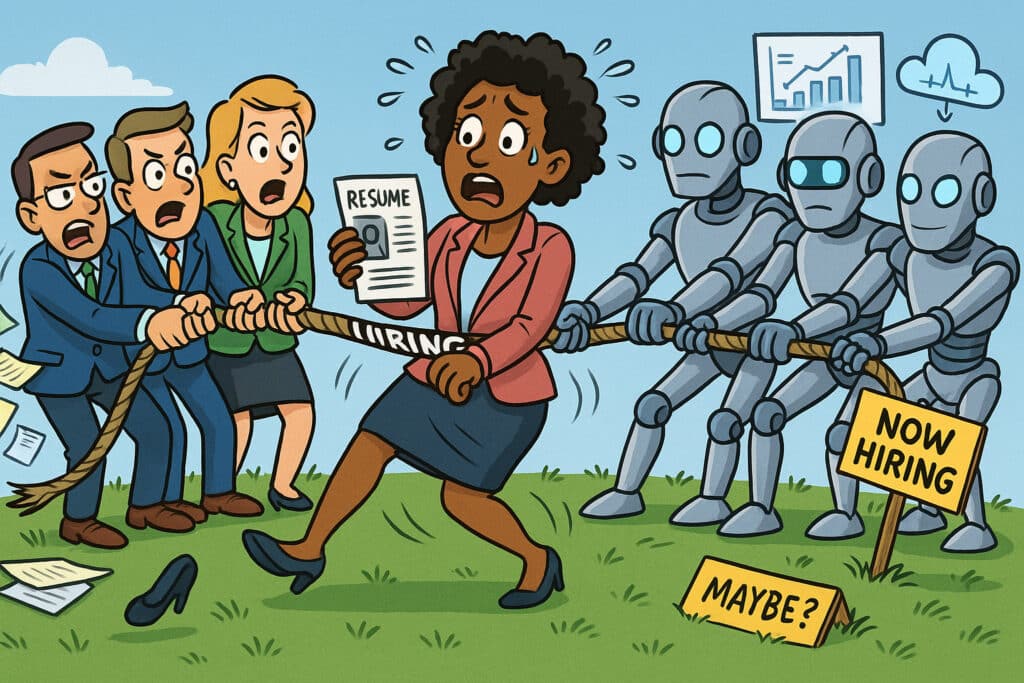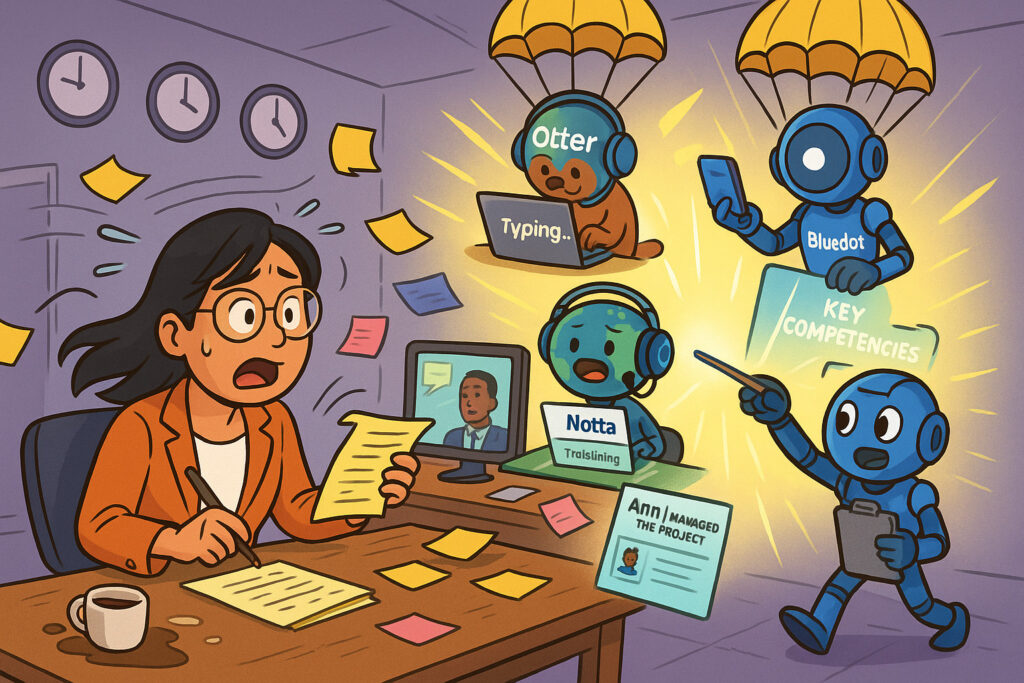Let’s be real for a second: if you’ve poked around the recruiting world at all lately, you’ve probably heard someone drop the term “AI” every five minutes. I get it! It’s everywhere. Heck, even the email I sent last week to a friend in HR had an auto-generated subject line. But here’s what nobody tells you—artificial intelligence in recruiting isn’t just a buzzword anymore. It’s showing up in every part of hiring, from the second you post a job to the moment you send out an offer (or that awkward rejection email).
But does that mean we just let the robots run the show? Uh, not so fast. Let’s dig in.

From my vantage point behind the IT helpdesk, I’ve watched recruiting teams transform—sometimes overnight—when they bring in AI-powered tools. Here’s what’s really going on under the hood with artificial intelligence in recruiting:
1. Finding People Where They Are (Sourcing)
Back in the day, finding good candidates meant scrolling endlessly on job boards and praying someone actually replied. Now? Artificial intelligence in recruiting does the stalking for you (not in a creepy way, I promise). These systems crawl LinkedIn, resume banks, and even old databases to spot people who have the right buzzwords and skills for your roles.
2. Saving Your Eyes on Resume Review
I’ll never forget that one manager who swore he’d go blind if he had to read another 200 resumes in a day. Good news: now the bots can handle it. AI in recruiting quickly scans, sorts, and ranks resumes so you only deal with the top picks—no more sifting through three pages to discover your unicorn.
3. Chatbots: Your New (Unpaid) Recruiting Assistant
Remember those nights answering the same “how do I apply?” email for the tenth time? Artificial intelligence in recruiting powers chatbots that now do all that—answering questions, walking candidates through the process, and even handling those basic first-round questions that eat up so much time.
4. Interview Scheduling Without the Calendar Headaches
We’ve all played that game of calendar Tetris trying to book interviews. Now, AI in recruiting tools sync with everyone’s schedules and send invites out automatically. Is it magic? Maybe. At the very least, it’s a time-saver.
So What’s the Deal with Generative AI?
If you’ve played around with things like ChatGPT and monica.im, then you already know generative AI can spin up text on demand. Recruiters are using artificial intelligence in recruiting to:
- Whip up snappy job descriptions based on a few bullet points.
- Send out outreach emails that don’t sound like a robot wrote them (ironically).
- Boil down long resumes into bite-sized summaries for busy hiring managers.
- Cook up tailored interview questions based on what a candidate’s resume actually says.
Some new chatbots are even getting so good at “talking” that candidates can’t tell if they’re chatting with a human or not. (My advice: always tell candidates up front if they’re chatting with a bot. It’s just good manners.)
The Good, the Bad, and the Occasionally Ugly of Artificial Intelligence in Recruiting
Let’s not kid ourselves—AI isn’t all sunshine and rainbows.
What’s Awesome:
- Artificial intelligence in recruiting saves time: The robots handle all the grunt work, so you can focus on the parts of hiring that actually need a human touch.
- Cuts costs: Less busywork means your team can do more with less.
- Better matches: AI in recruiting spots patterns you might miss, so you’re more likely to find someone who actually fits the job.
- Happier candidates: Quick responses, fewer “where am I in the process?” emails, and a smoother ride for everyone.
- Small teams, big results: If you’re running lean (which, let’s face it, most SMBs are), AI gives you a fighting chance against the big companies.
What’s Tricky:
- Bias can creep in: If the data artificial intelligence in recruiting is trained on is biased, it’ll just repeat those same mistakes. Suddenly you’re rejecting the same type of candidate over and over, and nobody knows why.
- Black box decisions: Sometimes even the folks who built the AI can’t explain how it made a choice. Not ideal when someone asks, “Why didn’t I get the job?”
- Robots aren’t great at being… human: Over-automating means candidates can start to feel like they’re just numbers in a spreadsheet. Nobody likes that.
- Data privacy headaches: You’re dealing with a ton of sensitive info. Get this wrong, and you’ll have bigger problems than just a bad hire.
- Not for every job: Artificial intelligence in recruiting is awesome for high-volume roles, but if you need someone with a super-niche skill set, nothing beats old-fashioned human judgment.
Watch Out: Rules and Red Tape
Depending on where you are, there are more and more laws around using artificial intelligence in recruiting. For example:
- Europe’s GDPR: Candidates must know if AI is in the mix, and they have the right to ask for a human review.
- USA (EEOC): You can’t use AI in a way that discriminates.
- New York City: They’ve got local laws just for this!
Even if your area isn’t strict, being open about how you use artificial intelligence in recruiting is the right move.
How to Make Artificial Intelligence in Recruiting Work for You, Not the Other Way Around
Here’s my advice, having seen teams struggle and succeed:
- Let humans make the final call. Use artificial intelligence in recruiting to help, not to replace people.
- Audit for bias—often. If the results start to feel fishy, dig in and see what’s up.
- Be upfront with candidates. Tell them when AI in recruiting is involved.
- Don’t ghost your candidates. Use AI to help keep things moving, but always offer a real person to talk to.
- Start small. Try it for resume screening or scheduling before you roll it out everywhere.
FAQ: Artificial Intelligence in Recruiting
Will AI take over all hiring decisions or do humans still have control?
Nope, the robots aren’t running the show—at least, not yet! While artificial intelligence can handle the grunt work like sorting resumes, scheduling interviews, and answering basic candidate questions, humans still make the final call. The best recruiting teams use AI as a tool, not a replacement.
How does AI actually help with recruiting?
AI makes life easier in a bunch of ways. It can quickly source candidates from all over the internet, scan and rank resumes so you’re not buried in paperwork, answer candidate questions 24/7, and handle the headache of interview scheduling. In short, it cuts down on busywork and helps you find the right people faster.
Are there any downsides or risks to using AI in hiring?
For sure—AI isn’t perfect. It can accidentally reinforce hiring biases if it’s trained on biased data, and sometimes it’s hard to understand why an AI made a certain decision (“black box” problem). Plus, over-automating can make candidates feel like numbers. Oh, and don’t forget about privacy laws—depending on where you’re hiring, you might need to follow specific rules about using AI and be super transparent with candidates.
Real Talk: You Can’t Avoid Artificial Intelligence in Recruiting, So Use It Wisely
AI isn’t just coming for recruiting—it’s already here. Most ATS and CRM platforms sneak in artificial intelligence in recruiting, even if you don’t notice. Trying to dodge it is like trying to avoid email. (Good luck with that.) The trick is using it on your terms, with some common sense and a whole lot of transparency.
Use the bots to get through your to-do list, but keep the people part front and center. That’s what makes great hiring feel human—even when the machines are helping behind the scenes.



